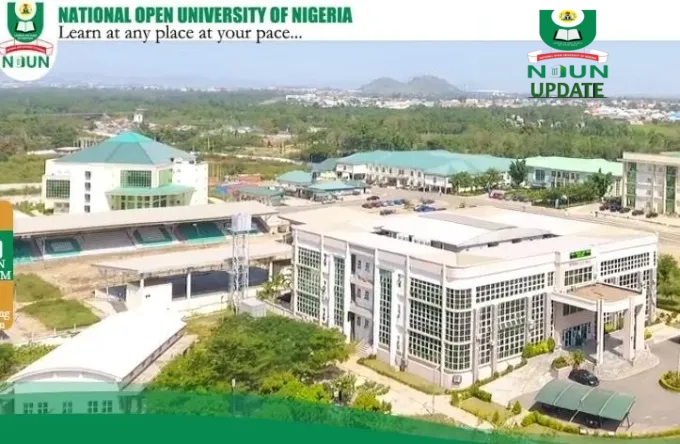NOUN Guides & How To's
The Complete Noun Student Manual
August 7, 2025Welcome to the National Open University of Nigeria (NOUN), a pioneering institution and a catalyst for transformative education. As a student of NOUN, you are part of a vibrant and diverse community of learners who are charting a new path toward professional and personal growth. Whether you are a working professional, a dedicated parent, or a first-time university student, the journey ahead is both flexible and demanding.
This manual is your definitive and comprehensive resource, designed to equip you with the detailed knowledge and proactive strategies needed to not only survive, but to truly thrive in the open and distance learning environment.
Part 1: The Administrative and Structural Framework
Understanding the institutional ecosystem is the crucial first step. Your success depends on your ability to navigate the official channels and leverage the university's support systems.
Your Study Centre: The Local Hub of Your Academic Life
Your study centre is your most direct link to the university. It is a multi-faceted resource that serves as:
An Administrative Base: The place for all your physical documentation, official letters, and in-person inquiries.
An Examination Centre: The venue for all your Computer-Based Tests (CBTs) and Paper-Based Examinations.
A Resource Centre: Housing a physical library and, in some cases, computer labs.
A Social Space: The hub for meeting fellow students, forming study groups, and attending face-to-face tutorials.
Actionable Advice: We strongly recommend visiting your study centre at the beginning of each semester. Introduce yourself to the Centre Director, academic counsellors, and administrative staff. They are your first line of support.
Mapping Your Academic Journey: Programme Structure and Course Registration
Do not simply register for courses semester-by-semester. Take a macro view of your entire programme.
Understand Core vs. Elective Courses: Your programme handbook clearly outlines the compulsory courses (core) and the optional ones (electives) you need to graduate. Plan your registrations to meet all requirements on time.
Adhere to the Course Credit Load: Be mindful of the maximum and minimum number of credit units you are allowed to register for each semester. Registering too few can delay your graduation, while registering too many can lead to academic overload.
Timely Registration is Non-Negotiable: The university has strict deadlines for course and examination registration. Missing these deadlines can lead to an extra semester or even an entire academic year of delay. Always register and make payments well in advance.
The NOUN Student Portal: Your Digital Nerve Centre
The student portal is arguably the single most important tool in your academic toolkit. You must master its functions.
Course Registration & E-courseware: This is where you select your courses and download your official study materials. It is essential to download all your e-courseware at the beginning of the semester and save them offline.
TMA and Result Management: The portal is where you submit your Tutor-Marked Assignments (TMAs) and where all your semester results are published.
Financial Records: The portal provides a comprehensive history of all your fee payments and receipts. Always download and save your payment receipts for future reference.
Part 2: The Core of Academic Success: Self-Management and Proactive Learning
The true measure of a NOUN student's success lies in their ability to manage their time and actively engage with their studies.
Developing a Proactive Study Schedule:
As a distance learner, you are your own primary educator. Create a realistic and flexible timetable that respects your personal and professional commitments.
Time Blocking: Dedicate specific hours of the day or week solely to studying. Block out time for reading, note-taking, and completing assignments.
The Pomodoro Technique: Consider using techniques like this to maintain focus. Study for short, concentrated bursts (e.g., 25 minutes) followed by a brief break.
Consistency over Intensity: A little bit of consistent study every day is far more effective than an all-night cram session before an exam.
Mastering the E-Courseware: From Passive Reading to Active Engagement
Your e-courseware is a treasure trove of information, but it is not a passive read.
Create a Study Hierarchy: Start by skimming through the module's introduction and summary to get a broad overview. Then, go back for a detailed, focused reading, taking notes as you go.
Mind Mapping and Summaries: After each unit, try to summarize the key points in your own words. Use mind maps or flowcharts to visualize complex topics and their interconnections.
Self-Testing: The questions at the end of each unit are not just for show. Answer them without looking at your notes to test your comprehension.
Leveraging the Full Learning Ecosystem:
You have a wealth of resources at your disposal. Use them all.
Tutor-Marked Assignments (TMAs): TMAs are a crucial part of your assessment, contributing a significant percentage to your final grade. They are designed to test your understanding and prepare you for the main exams. Submit them on time and take them seriously.
The e-Library and Journal Databases: Go beyond your courseware. The university's e-library provides access to countless journals, articles, and supplementary books that will deepen your knowledge.
Peer Networks: Combat the potential isolation of distance learning by joining online forums, WhatsApp groups, or in-person study groups. Collaborative learning is an excellent way to clarify difficult concepts and gain new perspectives.
Part 3: Essential Policies, Examinations, and Support Systems
Adherence to university protocols is non-negotiable. Knowing the rules and your rights as a student is crucial.
Upholding Academic Integrity: NOUN has a zero-tolerance policy for academic misconduct. This includes:
Plagiarism: Submitting another person's work as your own.
Impersonation: Having someone else write your exams.
Examination Malpractice: Any form of cheating during tests.
The consequences for these offences are severe and can include suspension, rustication, or expulsion. Protect your academic future by upholding the highest standards of integrity.
Navigating the Examination Process:
The examination period is a critical time for every student.
Registration and Slip Download: Ensure you register for your exams on the portal. You will then be able to download and print your official exam slip, which is your permit to write the exams.
Computer-Based vs. Paper-Based: Be aware of which format your exams will take. All 100 and 200-level courses are typically CBTs.
Exam Day Protocol: Arrive at your study centre well before the scheduled time. You must have your student ID card, exam slip, and proof of payment.
Accessing Support Services:
Seeking help is a sign of proactive engagement, not weakness.
For Subject-Specific Help: Your assigned course tutors are your first point of contact for questions about the course content.
For Academic Planning: Your study centre's academic counsellors can help you with course selection, credit loads, and other academic issues.
For Administrative Concerns: The staff at your study centre can help you with issues related to registration, results, and fees.
Your journey at NOUN is a marathon, not a sprint. By understanding the system, engaging proactively, and utilizing the resources at your disposal, you will be well on your way to earning a degree that reflects not only your academic achievement but also your resilience and dedication. We wish you every success in your academic pursuits.
More GUIDES

The Complete Noun Student Manual

NYSC Procedure For NOUN Graduates: A Comprehensive Guide To Obtaining An Exclusion Letter

NOUN Anthem & Lyrics

NOUN Portal Registration Procedure For Returning Students

Examination Rules & Regulation for NOUN Student

Step By Step Process On How To Apply For NOUN Admission
Scholarships & Opportunities
Latest Gists
Popular in NOUN
-
 About NOUN
About NOUNExCorp
-
 How to Apply
How to ApplyExCorp
-
 Programmes
ProgrammesExCorp
-
 Fee Schedule
Fee ScheduleExCorp
-
 Study Centres
Study CentresExCorp
-
 NOUN ACETEL
NOUN ACETELExCorp
-
 PG School
PG SchoolExCorp
Resources
-
NOUN Past QUestions
-
NOUN Fee Checker
-
NOUN Personalized Timetable
-
NOUN TMA Archive
-
NOUN Crib
-
NOUN Examination Practice
-
NOUN CGPA Calculator
-
Purchase Project & Seminar
-
Purchase Exam Summary
-
Purchase Business Plan (GST302)
-
Useful Files
-
Course Materials
-
NOUN Plagiarism Checker
-
Generate Exam Clearance Slip
-
Generate Project Topic Slip
Scholarship & Opportunities
-
Top Udacity Nano-degree Programs Courses Download For Free
-
Free Course: The Complete Ethical Hacking Course; Beginner To Advanced!
-
Free Course: 2023 Complete Python Bootcamp From Zero To Hero In Python
-
Internship: 2023 Shell Student Industrial Training And Internship Program
-
2023 I4g Cybersecurity Scholarship For Young Africans
Career Lighthouse
-
Self-Exploration
-
Career Exploration
-
Goal Setting
-
Resume Building
-
Interview Skills
-
Networking
-
College and Vocational Training
-
Financial Literacy
-
Professional Development
Quick Links
-
Frequently Asked Questions (FAQs)
-
Faculty of Agricultural Science
-
Faculty of Art
-
Faculty of Education
-
Faculty of Health Sciences
-
Faculty of Management Science
-
Faculty of Science
-
Faculty of Social Science
-
Faculty of Law
-
Business Creation & Growth (GST302)
-
After Admission into NOUN What Next?
-
Graduation Final Clearance Process


![[Apply Now] Midwestern Oil/suntrust Oil 2023/2024 University Scholarship Award Scheme For Nigerian Undergraduate Students](scholarship_images/midwestern.webp)
![[Apply Now] Knust Mastercard Foundation Undergraduate Scholarship For African Students](https://i.postimg.cc/W12C13v0/scholarship-cap.jpg)



